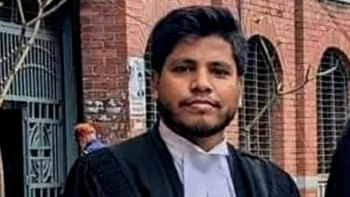‘Give us food, then enforce lockdown’

As the "lockdown" was extended for seven more days from April 22 to 28, labourers living from hand to mouth feared the distresses that lay ahead.
Rickshaw-pullers, auto-rickshaw drivers and hawkers said if they do not go out to work, their families would starve.
"It's very easy to announce a 'lockdown'. But people like us bear the brunt. Give us food, then enforce a lockdown," said Md Hossain, who sells wallets and sunglasses on the sidewalk in Farmgate.
In the last week, he was unable to fully open his shop.
"Even if I opened for some time, dodging police, there were no customers," he said, adding that he is now empty-handed.
Hailing from Monohorgonj of Cumilla, Hossain recalled the lockdown last year when he went back to his village and was jobless for two months.
"We are a family of 11 and had to take loan from others. We got no help from the government. We heard that the government gave relief, but we didn't see that," Hossain said in frustration.
Like Hossain, some other hawkers in Farmgate also tried to open their shops dodging the police yesterday.
Labourers, rickshaw-pullers and CNG-run auto-rickshaw drivers said they were worried about the lockdown as the financial setback it has dealt is more than that of possible health setbacks.
During the ongoing weeklong "strict lockdown", the number of rickshaws and auto-rickshaws on the streets has been increasing every day despite the restrictions and, what rickshaw-pullers and auto-rickshaw drivers termed, harassment at police check points.
As the days go by, the restrictions during the weeklong "lockdown" seem to be relaxing. On the sixth day yesterday, all types of transport except buses could be seen plying the roads of the capital. Moreover, the movement of pedestrians has also increased.
Those dependent on daily earnings for their livelihood said they have no problem staying at home, but the government must ensure food and aid for them.
Mosharraf used to work as a helper on a bus that ran between Dhaka and Chattogram. The pandemic caused a change in his profession -- since last year's lockdown, he has been working as a rickshaw-puller in Dhaka.
"Last year, we got aid from affluent people. On the streets, you could see them with bags of relief. But this time, there is nothing. No one is helping us," said Mosharraf.
He said if he does not take his rickshaw out even for a day, his family would have to starve.
"Now I can earn Tk 300-400 daily. My rent is Tk 4,000. I have three children. How will I run the family if the lockdown extends like this?" Mosharraf asked.
In Farmgate, another rickshaw-puller, Nurul Islam from Jamalpur, was sitting idly with three others in the afternoon, with no possible passengers in sight.
"Now there is no crowd. It's a matter of luck to get a passenger. Earlier, we used to charge Tk 250 to go from Farmgate to Gabtoli. Now the passenger offers only Tk 60," Nurul said.
They said extension of the lockdown is a curse for them.
Meanwhile, auto-rickshaw drivers and workers of light vehicle demanded direct food and financial support from the government to survive amid the all-out lockdown that has been announced until April 28.
In a joint statement, Bangladesh Auto-Rickshaw Light Vehicle Transport Workers Federation (BALTWF) President Abul Hossain and Secretary Md Golam Faruk said the operation of lakhs of three-wheelers and light vehicles has been suspended due to the lockdown.
"This ultimately left us in big trouble as we have become unemployed and our families will have to spend the days unfed," they said.
They want the government to provide financial and food support so that families of drivers and workers could survive in the month of Ramadan.
According to a new study by Centre for Policy Dialogue (CPD) and Bangladesh Institute of Labour Studies (BILS), over 3 percent of the labour force lost jobs while 16.38 million people became new poor amid the pandemic.
The most affected workers' groups were the labourers in urban areas engaged in construction, informal services, rickshaw-pulling, and launch and boat driving.
Self-employed people like street vendors, hawkers, tea sellers, food stall owners and repairmen were also among the worst hit.


 For all latest news, follow The Daily Star's Google News channel.
For all latest news, follow The Daily Star's Google News channel. 



Comments